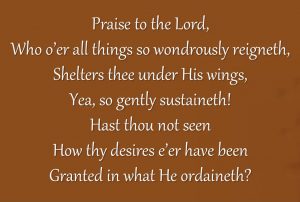America! America!
God mend thine ev’ry flaw,
Confirm thy soul in self-control,
Thy liberty in law.
—Katherine Lee Bates—
Key point: The Ten Commandments provide a platform for National Liberty and prosperity.
A one-page summary of this article is available here.
A related Facebook post from cultural observer Caleb Backholm is available here.
From this video, hear the congregation of Grace Community Church in Sun Valley, California, sing the second stanza of “Praise to the Lord, the Almighty, the King of Creation.”

The writer of this hymn, Joachim Neander (1650-1680) did not live a long life, but when he trusted Christ he was profoundly transformed. A number of Neander’s “hymns can be found in hymnals today, having inspired Christians around the world for more than three centuries.”
The insight in the rhetorical question posed in the second stanza of “Praise to the Lord, the Almighty, the King of Creation” is, to me, extremely significant. The hymn writer asks,
Hast thou not seen
How thy desires e’er have been
Granted in what He [the Lord] ordaineth?

What do people desire at the very core of their being? They want to be free, but ultimately, they do not want a freedom that leads to a dead end — and this is exactly the place at which they will arrive if they follow the path down which their base desires and appetites take them. As Josh McDowell has observed, freedom isn’t being able to do whatever you want to do; it’s having the power to do what you ought to do.
Authentic liberty is freedom with order and purpose, and that kind of liberty can be found only in obeying God’s laws. Here I do not mean obeying God in a legalistic, burdensome manner, but obeying Him because He is God and looking to Him for ultimate purpose and meaning in life.
Law and Liberty
How is it that following God’s law gives a person freedom? Consider this. As Christians, we tend to think of the Ten Commandments as being a set of laws that we as individuals are obligated to obey, and certainly they are, for each one of us is accountable to the God who gave His laws to us. Having come from God, His commands “are absolute,” writes Dennis Prager. They “stand in direct opposition to all relativistic approaches to morality — the notion that each individual or society determines what is right or wrong.”1

It is a commendable thing when one person obeys the laws of God, but think carefully how liberating it is on a corporate or national level when a society revers and obeys them. Let’s think first about this in relation to the last five of the Ten Commandments. If my neighbor will
-
-
- obey the Sixth Commandment and refrain from killing me,
- obey the Seventh Commandment and respect my marriage relationship to my wife,
- obey the Eighth Commandment and not steal from me or my family,
- obey the Ninth Commandment and not lie about me, and
- obey the Tenth Commandment and not inappropriately desire what isn’t his, then
-
my rights to life, security in my marriage, property, a decent reputation (assuming I have earned it), and respect for my ownership of what belongs to me — all these rights — are protected, at least as far as my relationship with my neighbor is concerned.

Now, suppose all the members of my neighborhood respect and obey these commands. Suppose the citizens of the larger community do. Aren’t all of us freer and safer because of the mutual respect we have for one another’s rights — and the reverence we have for God?
When an individual departs from this respect and seeks to violate one or more of my rights, it is then the government’s responsibility to motivate that person to back off. This is why, in the Declaration of Independence, the Founders declared,
We hold these truths to be self-evident, that all men are created equal, that they are endowed by their Creator with certain unalienable Rights, that among these are Life, Liberty and the pursuit of Happiness. — That to secure these rights, Governments are instituted among Men, deriving their just powers from the consent of the governed.
In light of this statement, it should be obvious that it’s also the government’s responsibility to respect my rights as far as it is concerned. It should create and maintain to the greatest degree possible unhindered environment for me to exercise my God-given rights.

Moving on, think of the Fifth Commandment, the one about honoring one’s parents; and the first four commandments as well, those about honoring God. If there were widespread respect for these “first authorities” in people’s lives, would there not also be widespread respect for other legitimate authorities as well, and greater order in society at large? How many instances of violence and property damage would never have occurred during the past year?
A Founding — and Foundational — Principle
The Ten Commandments, you see, aren’t nearly as confining or as restrictive as they are liberating, especially if they are honored and obeyed on a societal level. The Founding Fathers of the United States of America understood this. How do we know? Because just before mentioning “unalienable rights” in the Declaration of Independence and indicating those rights existed because people were “endowed [them] by their Creator,” they wrote of “the Laws of Nature and of Nature’s God.” And yes, Founders believed these laws were absolute — neither relative nor subject to change.
Another way we know that America’s early leaders understood the liberating aspect of adherence to God’s laws is by reading what they wrote in other contexts. Here are some of the principles on which America was founded and built.

So, let me ask you: Haven’t you realized how your longings and desires have been and are met in and through what God encourages and commands? Here we’ve dealt with this question on a corporate, national level, but of course there are other aspects of it to consider. Everything pales in light of eternity. Through His Son, Jesus Christ, God and God alone brings authentic fulfillment and satisfaction to the one who trusts in Christ and relies on Him for forgiveness of sins. He offers eternal life to all those who come to Him on His conditions.
So, let me ask you: Haven’t you realized how your longings and desires have been and are met in and through what God encourages and commands?
Yet it still is true that
-
-
- “Blessed is the nation whose God is the Lord,” and that
- “Righteousness exalts a nation, But sin is a reproach to any people.”
-

Today, Christians need desperately to understand, as did the Founders, the relationship between liberty and law. It’s a relationship that makes ordered liberty and prosperity possible.
Christians also need to comprehend what happens when the societal consensus turns against the Ten Commandments and the God who graciously gave them. The truth is that no nation can remain free and prosperous if it spurns God and His laws. Instead, it faces the opposite of ordered liberty; it must endure chaos and tyranny.
We’ll explore how these things happen next time. Stay tuned.
Copyright © 2021 by B. Nathaniel Sullivan. All rights reserved.
Unless otherwise indicated, Scripture passages have been taken from the New King James Version®. Copyright © 1982 by Thomas Nelson, Inc. Used by permission. All rights reserved.
Note:
1Dennis Prager, Exodus: God, Slavery, and Freedom — The Rational Bible, (Washington, DC: Regnery Faith, 2018), 220, 221.


[…] Key to Freedom and Liberty, Parts 1 and 2, […]
[…] groups is because of a distorted understanding of true freedom and liberty. As Josh McDowell has observed, freedom isn’t being able to do whatever you want to do; it’s having the power to do what […]